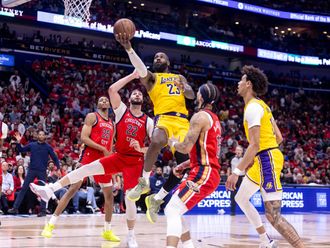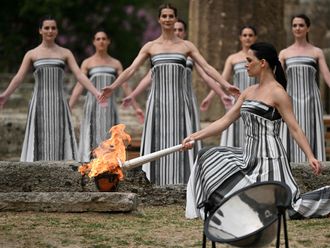Sydney: The favourite supermaxis led the fleet out of Sydney Harbour heading for Hobart on Monday as a fine weather forecast brought a new record back into sight at the start of one of the toughest yacht races in the world.
Under a blazing azure sky, hundreds of leisure boats lined the course to the Heads watched by masses of spectators on the shoreline as a fresh north-easterly sped the fastest yachts — all 100-footers — ahead of the 80-odd smaller vessels entered for Australia’s bluewater classic.
Skipper Anthony Bell’s Perpetual LOYAL was the first into open ocean followed by Hong Kong-owned Scallywag, and local race favourite Wild Oats XI trailed by the untested CQS of Finn Ludde Ingvall, who took line honours in 2000 and 2004.
As they flew south down the coast under spinnaker touching 26 knots in freshening northerly winds Wild Oats edged into an early lead, heading into a weak southerly change due to move through late on Boxing Day.
The Bureau of Meteorology said the southerly will be lighter than previously forecast at around 10 to 15 knots and on Tuesday winds will back around to the north again, far earlier than expected.
In the race for line honours, conditions favour the slim Wild Oats, which set the record of 1 day 18hrs 23mins 12secs for the gruelling 628-nautical-mile (1,163 kilometre) event in 2012.
Skipper Mark Richards said he’s not thinking about records, but rival David Witt, at the helm of Hong Kong businessman Seng Huang Lee’s entrant, Scallywag, certainly is.
“If I had to write a forecast for us, it would be this one,” he said. “Light air just forward of the beam really suits us.”
Witt said Scallywag could break Wild Oats’ race record. “Our routing puts us at the Iron Pot (mouth of Tasmania’s Derwent River) in 1 day 11 hours. That gives us 7 hours to do 14 miles and beat the record.”
Rival Bell on Perpetual LOYAL, the leading challenger to Wild Oats, was less pleased with Monday’s forecast noting that his heavier and powerful super maxi needs as much time to windward as it can get rather than the light southerly now predicted.
“We’ll have to be a lot more tactical and bear more risk to use the better points of our boat. We’ll have to sail away from the fleet to find more power reaching that will give us better boat speed,” Bell said.
In a bid to be more competitive, Perpetual has brought in half the world-class crew of last year’s winner, the US super boat Comanche, which is not entered for 2016.
Aboard the hi-tech CQS, which slipped back to eighth, Ingvall reported: “We are somewhat underpowered at the moment, all the others have spinnakers and we do not, but it is still early stages.”












